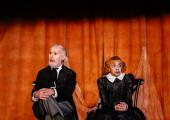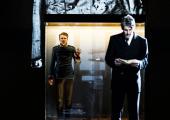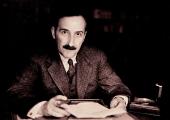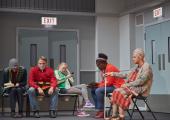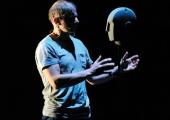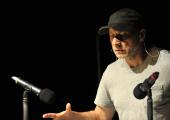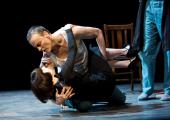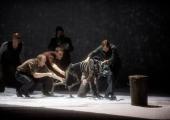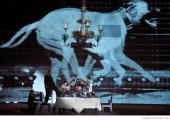From discreetly poisoned violets at Covent Garden to buckets of man-dog blood in St Martin’s Lane has been quite a leap this week. True, the bourgeois plastic surgeon of Mikhail Bulgakov’s scabrous, long-suppressed 1925 novella goes about singing Aida while implanting testes and pituitary glands. But such melodies are only satirical snippets in Alexander Raskatov’s febrile newish score. And that needs the jumpy fantasias of Complicite style, not the lavish historical realism of David McVicar: which means both ENO and the Royal Opera are currently excelling in what they do best.
For make no mistake, A Dog's Heart at the Coliseum is the full music-theatre package, an apogee of what the company has been striving for in its recent co-option of video projection and complementary theatrical disciplines - here led by Complicite's ever-ingenious Simon McBurney.
Having spent some time with Russian Raskatov's score, and a recording of the June 2010 Amsterdam premiere, I'd had a few concerns. One ever so faintly lingers: that the composer and his librettist, Cesare Mazzonis, shouldn't have tried to accommodate all the incidents of Bulgakov's terse two-part fiction about a stray mutt taken in by a Doctor Frankenstein of a large Moscow apartment and turned, by means of implanting body parts from an old drunk, into a proletarian nightmare. Prokofiev or Shostakovich, had they been permitted access to the master writer's early satire (it was only published in 1987), might have set it more selectively. But here, despite cuts, the pace occasionally falters, despite Martin Pickard's racy translation of the Russian original.
That said, Raskatov packs in material enough for a dozen new operas. He follows his chief master, Schnittke, in touching on a wealth of references including Bach, Wagner, Soviet mass songs and Russian liturgical music, as well as what Schnittke used to call "pseudo quotations". But would the disciple's brew mix as well as Schnittke's "polystylism"? It did last night, chiefly thanks to the marvellous Garry Walker's razor-sharp conducting and a vocal team reaching out to the bounds of the possible that Raskatov's awkward, all-over-the-shop writing for them demands: both, simply in terms of musical execution, streets ahead of what I heard on the Amsterdam recording.
But this is, above all, often visionary theatre that ought to beguile newcomers to ENO. Finn Ross's video projections hook us from the first multilayered snowstorm to the various agitprop banners, archival crowd scenes and Muybridgesque sequences of running dogs and men; the set designs, by Michael Levine and Luis Carvalho, centre around a simple but brilliant evocation of the smug doctor's over-large central apartment room, elaborate chandelier rampant. There are rivers of blood which flow off the hydraulic stage, and a rather scary overflow when the man-dog gets trapped in the bathroom with a cat he's persecuting.
Within these confines - and in the mounting proletarian menace on the fringes - Complicite's McBurney, directing his first opera, matches the collage fabrics of Raskatov's score with plenty of action but never too much stage mess. Our sympathies are engaged by the victim. First it's a skeletalised Giacometti mutt, brilliantly steered by Mark Down and his fellow puppeteers from Blind Summit Theatre. I didn't much care for their puppet-child in the wildly overrated Minghella production of Madam Butterfly, though granted, the art when skilfully done makes the figure live. And here it did so in a much more convincing context.
Dog Sharik rolled his black eyes appealingly, attacked and rolled over exactly as a wild dog might. Inevitably the much simpler cat puppets his semi-human self eventually stalks almost stole the show: how Bulgakov, creator of the unforgettable feline in The Master and Margherita as well as the moggy who tears the curtains in the theatre-novel Black Snow, would have laughed. But Sharik has a soul, too, split between the megaphoned vocal acrobatics of Raskatov's wife, Elena Vassilieva, and the more poetic soul of Andrew Watts - the most clarion and persuasive countertenor in the business, as his previous appearances in ENO's Le Grand Macabre and the rather thankless outer wastes of Schnittke's Faust opera in semi-staged performance have already revealed.
Yet there's no lowering of interest when surgery turns the dog into Peter Hoare's Polygraph Polygraphovich Sharikov, stipulated by Raskatov as a "tenore coloratura buffo" - in other words, the embodiment of Gogol's petty official Nose in Shostakovich's genius black comedy, but with humanity. And Hoare so touches with his Sharikov's awkward dog-like movements and weird appearance that we quickly feel sorry for a creation who only does what his human and canine components have programmed him to do.
Sharikov's antics set the drama careering, and many in the audience thought they were getting a much livelier second act - though in fact Raskatov often recapitulates elements from the first, and McBurney honours the symmetries. There's no doubt, though, that the cameos wheeled on to demonstrate Professor Preobrazhensky's domestic and professional worlds in Act One, vividly stylised from Nancy Allen Lundy's yapping, caricatural maid to Frances McCafferty's knicker-dropping, lustful old lady, stop us from getting to the point. On the other hand the havoc wrought by his man-dog brings Steven Page's Professor to the brink of madness in a drinking scene with his assistant Bormenthal (Leigh Melrose). At last the flippertigibbet musical language settles to a ground bass and then a mournful repeated rhythm as the consequences begin to kick in. Page, in his second committed assumption of a tricky contemporary-opera role this year, has a bit of trouble with Raskatov's insane ranginess but carries off the pompous authority of the days-are-numbered doctor with his usual aplomb.
The operations are suitably gruesome and won't be viewed by the squeamish, even though the first begins in mesmerising silhouette - and here, too, in both climactic actions, Walker screws Raskatov's music to the sticking-point far more compellingly than it had been at the premiere. Laughs? Yes, there are quite a few, especially when the cats go up the wall. But very often they die on our lips. That's the prerogative of great satire: it's what Bulgakov's genius is all about. This opera and its execution do that superlative justice. Don't miss it.
Overleaf: watch the opening of Vladimir Bortko's 1988 Russian TV film based on Bulgakov's A Dog's Heart
